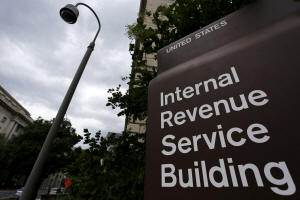Republicans call it an 'army' but IRS hires will replace retirees, do
IT, says Treasury
 Send a link to a friend
Send a link to a friend
 [August 19, 2022]
By David Lawder [August 19, 2022]
By David Lawder
WASHINGTON (Reuters) - New U.S. Internal
Revenue Service (IRS) hires over the next decade will mainly replace
retiring Baby Boomers, answer taxpayer questions and program new
computers, U.S. Treasury officials and tax experts said, responding to
Republican claims that the IRS will recruit 87,000 new agents to harass
Americans on their taxes.
The Republican attack ads and social media messages follow a decade of
Republican-passed budget cuts in Congress for the IRS, leaving it with
16,000 fewer employees in 2021 than it had in 2010. The agency is
responsible for collecting the bulk of nearly $5 trillion in annual U.S.
revenues.
Days after President Joe Biden signed the Inflation Reduction Act that
includes $80 billion in new IRS funding over 10 years, Republicans
including Florida Governor Ron DeSantis have continued criticizing that
funding on social media.
"I think it was basically a middle finger to the American public that
this is what they think of you," DeSantis told a news conference on
Wednesday. "All the problems we have to deal with and they think the way
is to do 87,000 IRS agents."
Kevin McCarthy, the top Republican in the House of Representatives, has
said Democrats plan to hire an "army of 87,000 IRS agents," more than
the population of Biden's hometown of Scranton, Pennsylvania.

Others, including Republican Representative Marjorie Taylor Green, have
repeatedly said that 87,000 new agents would be armed.
A Reuters Fact Check found that only 2,100 special agents in the IRS
Criminal Investigation branch are authorized to carry firearms.
The 87,000 figure does exist, buried within a May 2021 Treasury
Department report when the Biden administration was pushing a bigger
spending bill with the same $80 billion IRS funding. The report
estimated the money could fund 86,852 full-time hires through 2031.
But the actual net staff increase would be far lower, as the IRS expects
over 50,000 employees to retire over the next five years alone, said
Natasha Sarin, Treasury counselor for tax policy and administration.
Claims that all 87,000 would be auditors, criminal enforcement agents or
armed are "deeply dangerous nonsense - and false," Sarin told Reuters.
"The speed and voracity with which (Republicans) are coming at this is
really a testament to how important these resources are going to be -
because there are many wealthy tax evaders that stand to lose a lot,"
Sarin said.

[to top of second column]
|

A security camera hangs near a corner of
the U.S. Internal Revenue Service (IRS) building in Washington May
27, 2015. REUTERS/Jonathan Ernst/File Photo

The new resources are aimed at closing an estimated $600 billion
annual "tax gap" - taxes owed but unpaid - by cracking down on
evasion by the wealthy, especially those with opaque income sources.
The Congressional Budget Office has estimated the funding would
increase federal revenues by $204 billion over 10 years - key to
climate and healthcare spending.
U.S. Treasury Secretary Janet Yellen directed IRS Commissioner
Charles Rettig this week to produce a $80 billion spending and
hiring plan within six months, but not to boost scrutiny on people
earning under $400,000.
Sarin declined to say how many revenue agents the IRS wants to hire
- a job category that stood at 8,321 in fiscal 2021.
MAKING THE IRS MORE LIKE ONLINE BANKING
After making up for attrition, the IRS hiring plan includes tens of
thousands of new customer service personnel and information
technology specialists.
These hires will develop technology tools to identify more high-end
audit targets and provide a customer experience on par with online
banking, she said.
"We’ll have an IRS that is able to serve Americans the way that they
deserve. That means an IRS, for example, that is able to answer the
phones," Sarin added.
Representative Kevin Brady, the top Republican on the tax-writing
House Ways and Means Committee, disputed Treasury's assertion that
many of the new hires would replace retirees, his office saying on
Twitter, "the existing budget can replace them. These are all new."
To target wealthy taxpayers and handle sophisticated audits, Sarin
said the IRS needs mid-career individuals with accounting and often
tax law experience.
Janet Holtzblatt, a senior fellow with the Tax Policy Center, a
Washington think tank, said it will be difficult for the IRS to
compete with the private sector for experienced employees in a tight
labor market as the IRS has salary limitations based on federal pay
scales.

"From the IRS' perspective, one area where they might be able to
compete on is offering a better quality of life," Holtzblatt said.
This includes more job security, government health care, pension
benefits and regular working hours.
(Reporting by David Lawder; Editing by Heather Timmons and Josie
Kao)
[© 2022 Thomson Reuters. All rights
reserved.]
This material may not be published,
broadcast, rewritten or redistributed.
Thompson Reuters is solely responsible for this content. |